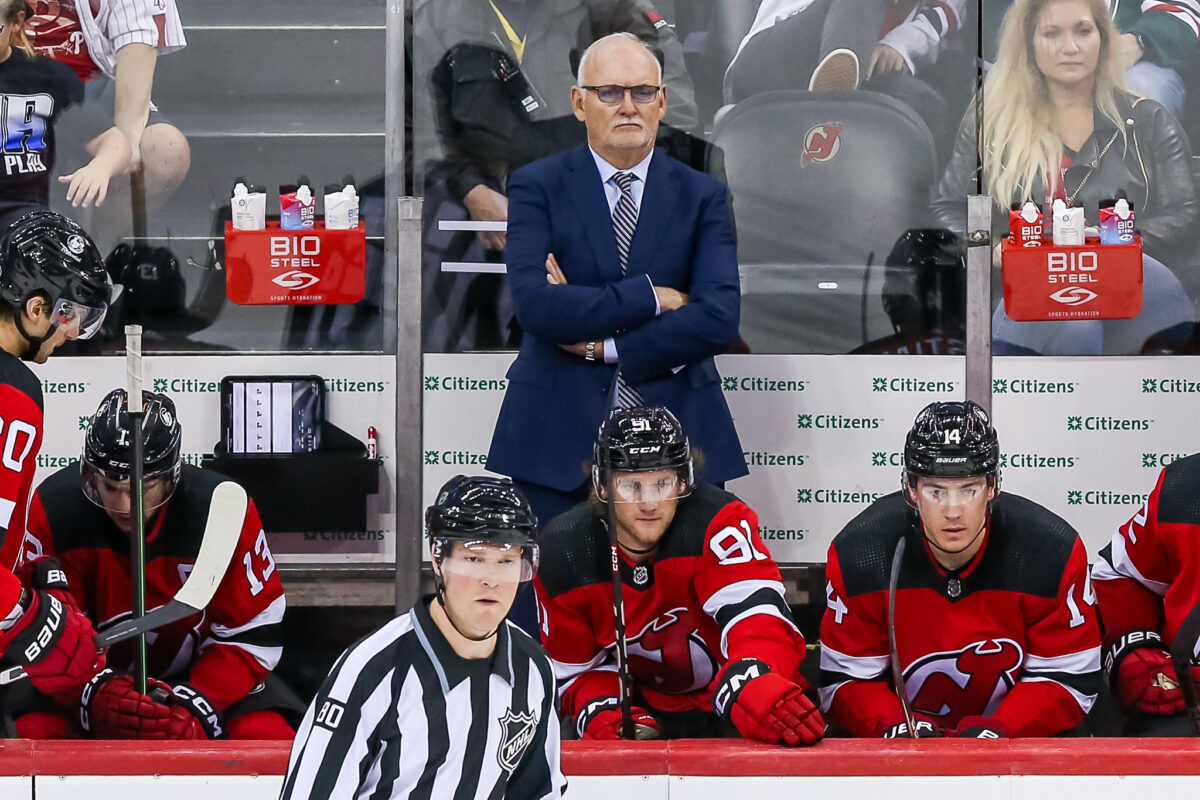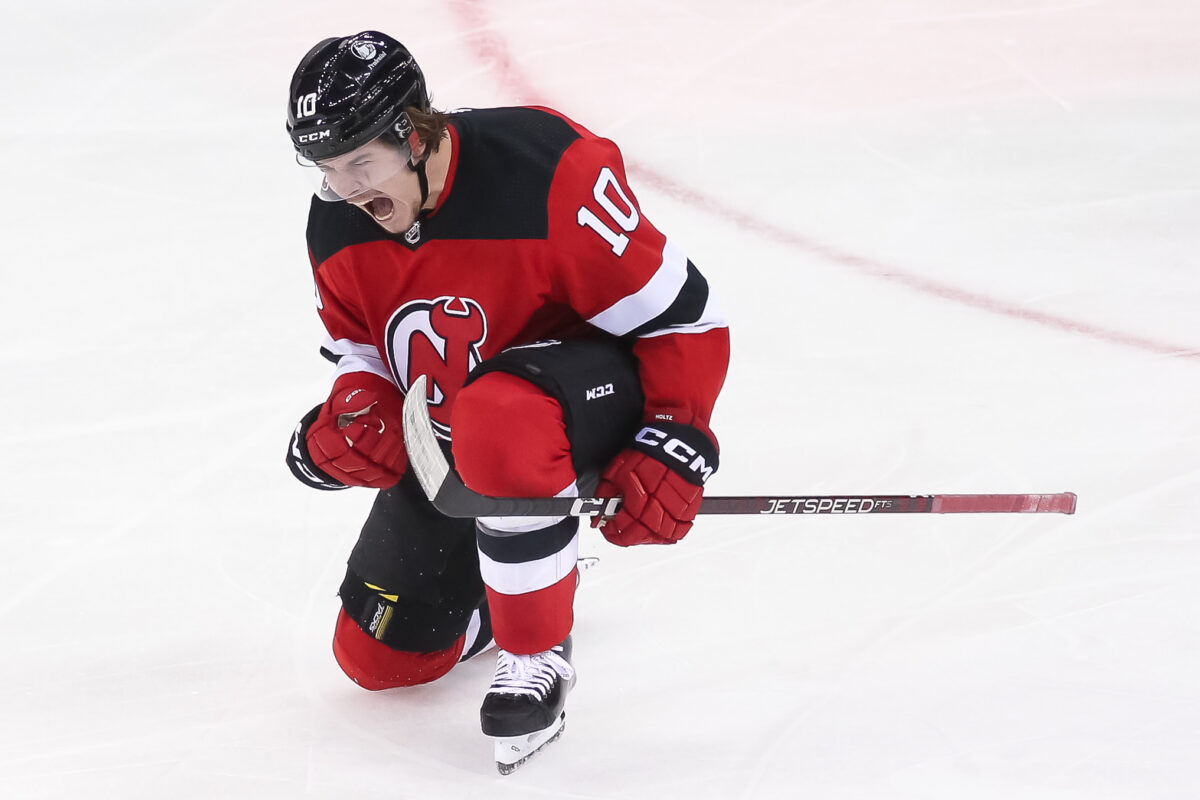The New Jersey Devils entered this season riding a wave of positive vibes. They had finally broken through, and their rebuild was ahead of schedule. The team’s success the previous spring in ousting the rival New York Rangers in a seven-game series set them up to be the darling of many prognosticators as a dark horse Stanley Cup contender. Unable to ride the wave, the team wiped out this season as almost everything that could go wrong did.
General manager Tom Fitzgerald is fortunate to have a young, talented core on team-friendly contracts for the next few years. This foundation will allow him another opportunity to try to build around the core of Jack Hughes, Nico Hischier, Jesper Bratt, Timo Meier, Luke Hughes, and Simon Nemec. Last spring, Fitzgerald talked about filling in the margins around his stars. In hindsight, his failure to build a supporting cast, address the goaltending issues, and replace players lost was ultimately responsible for many of the problems and failures of the team to continue on its upward trajectory. Here is a look at five problems that, if adequately solved, can relaunch the Devils on a championship course.
Who Is the Coach to Take the Devils to the Next Level?
Lindy Ruff began this season as the fifth-winningest coach in NHL history and a reigning finalist for the Jack Adams Award, which honors the league’s Coach of the Year. Several team members, including Hughes, had vouched for the coach in more challenging times, and he seemed poised to chase his first Cup. Sixty games later, after almost everything that could have gone wrong, Ruff was relieved of his duties as head coach and replaced with Travis Green, who would serve as the interim head coach for the remainder of the season. Absent a miraculous finish over the next two weeks, the Devils are likely to miss the playoffs and move on from Green.

Almost all decisions moving forward, except for acquiring a goaltender, should not be made until a coach is in place to ensure the personnel, coach, and system are a fit. The Rangers appear to have done this well by bringing in a coach and complementary pieces this off-season, which has led to them leading the Metropolitan Division wire-to-wire this season. Fitzgerald needs to get this hire right. Otherwise, he may squander the talent-laden team’s prime.
Plenty of coaches will be vying for the chance to coach players with the talent of the Hugheses, Hischier, Meier, Bratt, and Hamilton. There will likely be multiple coaches who have won a Cup available and interested; there is also the opportunity to take a less proven but more innovative coach or to select an experienced coach searching for his first Cup. Regardless of who is hired by Fitzgerald, it should be done expeditiously yet meticulously. This is the most consequential of the decisions facing Fitzgerald and quite possibly the biggest decision of his management career.
Who Centers the Third Line?
Once a coach is in place with a new system and play style, the first move should be to solidify who the team expects to be the 3C. The Devil’s season began with myriad choices to play 3C: Dawson Mercer, Erik Haula, and Michael McLeod, with Curtis Lazar and Tomas Nosek available as well. Haula did well for a time driving his line, but he has been elevated to play alongside Hughes as Jack recovers from the injury that hampered him the entire second half of the season and pushed him to the wing. Haula’s best games as a Devil and some of Jack’s have come when the duo are paired, regardless of which position each plays. Mercer broke in as a center but has flourished on the wing as a 200-foot player. Mercer has not taken that role for a team looking to win a championship despite being given the opportunity. The Devils should seek free agency or the trade market to solidify this need.
RELATED: 5 Devils the NHL Should Consider for Its Upcoming Amazon Series
This summer promises to be a busy one for Fitzgerald. While the coach and goalie are already on top of his list, the most consequential decision will be finding a third center that can take some of the harder minutes away from Hischier and Hughes defensively and still drive play enough to provide complementary scoring with wingers like Ondrej Palat, Mercer and others. The free agent market is remarkably barren at the center position. With the salary cap set to increase, teams will likely be forced to overpay for centers that enter the market. The other glaring issue is the lack of a right-hand shot center man on the roster and the loss of McLeod. Mercer and Lazar are both right-hand shots, but neither seems to be the long-term answer at the position. No right-handed centers with more than 14 goals are heading to free agency.
Fitzgerald has three options: Haula, Mercer, overpaying for Chandler Stephenson or Sean Monahan, or making a trade. The profile should be a right-hand shot center who can contribute to the penalty kill and take on other teams’ top lines while still driving play. In reality, they need to find a player who gives them what McLeod did for the first half of the season. Unfortunately, players with those skills are scarce. Fitzgerald and Green should consider giving Mercer an extended run at 3C for the remainder of the season to determine their needs. While an eight or nine-game stint isn’t dispositive, it could provide context as to how long-term a solution they need to acquire and give more context to the contract Mercer should be offered.
Who Plays With Jack?
The Devils have found linemates for Hischier. Since being matched together, the line of Hischier, Bratt, and Meier has been exquisite, averaging 4.6 goals per hour, the most of any line all season. Hischier seems to have synergy with Meier and has brought out the best in Bratt. Hughes had similar chemistry early in the season with Tyler Toffoli but has yet to find permanent wingmen. One of Fitzgerald’s main challenges this off-season is figuring out who is the guy or guys that can help Hughes elevate his game, serve as protection, win battles along the boards, and defend in the tough areas. The triple H line of Hughes, Haula, and Holtz has played well in a small sample size. In just over 60 minutes, the group has outscored opponents 2-0 and played to an expected goals-for percentage of just over 59, and that is with just shooting over six percent as a unit, well below their averages.

Perhaps Fitzgerald decides to keep Holtz and let him try to grow into the scorer they drafted alongside the talent of Hughes, adding the grit, faceoff ability, and defensive prowess of Haula to fill out the second line. If Holtz can become the 30-goal scorer they lost in Toffoli and minimize his puck management lapses, then the team can focus on other areas of the ice to invest, but they cannot afford to go into next season with Hughes having question marks on his line. The team needs to surround him with complementary pieces with whom he can develop chemistry and tilt the ice.
Striking the Correct Balance on Defense
Last season, the Devils deployed an almost perfect combination of defenders, mixing the best right-handed defense corps in the NHL with long, mobile partners on the left side. This season, the mix has been off since day one, but definitely since the loss of Hamilton at the end of November. The team has had to rely on too many inexperienced defensemen, while the formerly stalwart defenders Jonas Siegenthaler and John Marino have struggled to provide consistent shutdown minutes. The team boasts two of the best under-22 defensemen in the entire NHL who promise to become cornerstones of the team’s defense for a decade.
The five-month absence of Hamilton showed definite cracks in the unit that must be remedied by October. Heading into next season, the Devils have Hamilton, Marino, and Nemec on the right side and Siegenthaler, Bahl, and Hughes on the left under contract. It would be a mistake to begin the season with that same group, as it is clear the pieces don’t mesh. Fitzgerald would be wise to move one or two pieces for a more established veteran presence. Hughes and Nemec are untouchable unless Cale Makar or Quinn Hughes is coming back in the trade, so Bahl, Marino, Siegenthaler, and younger players like Hatakka and Seamus Casey should be available. Whichever decisions Fitzgerald makes will certainly be colored by introducing a new coach and finding defensemen that better fit the coach’s style and system.
Nick DeSimone, who they acquired off of waivers from the Calgary Flames, has proven to be a good fit with Hughes in limited minutes and has demonstrated that he would be a good value signing for the team who could at least serve as a 7th or 8th defenseman. His ability to sit for a month and seamlessly integrate into the lineup has been impressive. In just over 130 minutes with DeSimone on the ice at 5v5, the Devils have outscored opponents 8-2 and played to a save percentage of over 96%. They should also consider bringing back Brendan Smith with the understanding that he is there for his leadership, mentorship, and ability to kill penalties, serving primarily as an insurance defenseman. Finding the balance between youth, experience, offensive production, and defensive responsibility will be key to bouncing back next season.
Getting Saves When They Matter
Had Fitzgerald convinced Jake Allen to waive his no-trade clause earlier in the season, the Devils would comfortably be a playoff team right now. The influx of quality goaltending that arrived at the trade deadline with Allen and Kaapo Kahkonen has changed how the team has played. For much of the season, several players hinted at how the lack of even league-average goaltending had negatively impacted their play. For a team with such a young defense corps, the ability to get timely saves and erase defensive mistakes is critical, and the feeling that every mistake ended up in the back of the net visibly weighed on the team at times throughout the year.
The worst-kept secret in the NHL is that the Devils must acquire a top-level goaltender. The writing was on the wall after the playoffs ended last May. Still, Fitzgerald chose to run it back, gambling a year of his core’s prime on the ability of Vitek Vanecek to bounce back from the playoffs and resume his play as a top-flight regular season starter. The gamble did not pay off. Vanecek’s inconsistency and inability to get timely saves doomed the Devils to chasing games all year. This off-season, the mission is clear: the Devils need to get a goaltender to pair with Allen and be able to steal games. The Devils have been rumored to be interested in Jacob Markstrom, Linus Ullmark, and Juuse Saros. Each of the three has unique risks and rewards, but the Devils cannot fail to act this summer. With Nico Daws, Akira Schmid, Isaac Poulter, and Tyler Brennan all poised to be NHL goalies, there may not be a need for a five-year solution, but there is a need for an elite goaltender to start game one.
In a tale of two seasons, the Devils have experienced the agony of failure and the exhilaration of success. Heading into the third year, decisions must be made that will alter the trajectory of the careers of the franchise’s leaders, from superstar players to the general manager. After a year where every decision seemed to backfire and fortune never favored the team, the margin for error has shrunk considerably, and Fitzgerald must regain the tactical superiority he displayed a year ago.
